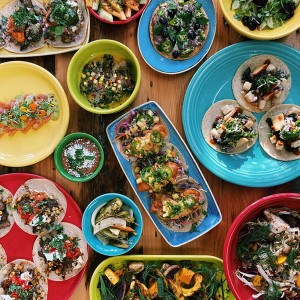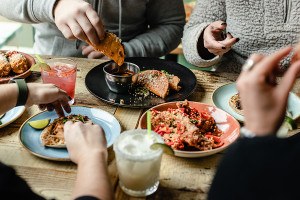Restaurant Review: Fairsted Kitchen

The warm dining room at Fairsted Kitchen. Photograph by Chelsea Kyle.
Ever since the tragic, premature, and heartbreaking closing of Hamersley’s Bistro, I’ve been carrying my lamp around, looking for an honest restaurant to patronize for dinner. (You don’t think I’m being overdramatic, I trust.) But indeed, it’s true that I’ve been on the hunt for authentic neighborhood spots, where the ownership is local, the welcome warm, and the food reliable. A place that feels just like home, but nicer, where you can take friends to catch up.
Nothing is likely to replace Hamersley’s, of course, and it’s unfair to hold any new restaurant to a standard that took decades for Gordon and Fiona Hamersley to perfect. But I’m still keeping a list of contenders, because I’m an optimist. At the top are Giulia and the original Bondir, and not far behind are Asta and Sycamore. And for just over a year now, Fairsted Kitchen has been quietly, and with dedication, serving its Washington Square neighborhood, attracting a magical cross-section of area diners: earnest, do-gooding neighbors sit barstools away from BU and BC undergrads. They’re all drawn here by beers on draft from Framingham’s Jack’s Abby; potent yet sweet-tending cocktails; and generously portioned “snacks and sides.” They also come for the interesting wine list, divided by flavor attributes (“stone and oak,” “bright fruit”), which features otherwise- unknown selections from Croatia and South Africa. These thoughtfully chosen vintages make up part of the root concept cofounders Steve Bowman and Andrew Foster developed for Fairsted Kitchen.
Both are front-of-the-house guys— Bowman’s training includes bartending at Russell House Tavern and earning a sommelier degree while working at Menton for wine guru Cat Silirie; Foster’s includes stints at Russell House, Il Casale, and Area Four, among others.
The snacks and drinks make this a go-to place for a night at the bar. As for the rest of Foster and Bowman’s concept—well, that’s not quite so easy to figure out. The website says that Fairsted was named for the nearby estate and offices of Frederick Law Olmsted, the great landscape designer and urban engineer. But the restaurant’s décor seems at odds with much of the menu. That is, the look is WASP circa the 1880s: Gold rosettes are stenciled on the pale turquoise walls; bookshelves are lined with old cookbooks and vintage serving pieces; and wooden Romanesque church-pew ends, used as room dividers, look like they could have come from Trinity Church. Such deliberate, grandmotherly fustiness implies that the restaurant might have a historical focus, like the South End’s Kitchen. But there are no dishes of yore on the menu, no nods to cookbooks of the past.
Instead, the cuisine is hard to place—it bears traces of post-back-to-the-earth, multicultural Moosewood, with some of Yotam Ottolenghi’s trendy Mediterranean flavors mixed in. But the base is French, reflecting the training of the chef, Jason Albus, at Troquet and Menton, where he met Bowman. The menu, divided as seems inevitable these days by size of dish, lends itself to sharing. What Fairsted lacks in expertise and precision it makes up for in friendliness—this is a place that really wants you to like it.

The grilled Wagyu zabuton with caramelized celeriac purée. Photograph by Chelsea Kyle.
That’s not hard when the dishes are as warm and nourishing as half a delicata squash (one of the “small” dishes, $14 each), roasted and filled with deviled crab, with technique reflecting the chef’s South Carolina childhood. It was served very hot out of the oven atop a generous bed of plain wild rice, and, like much of the food here, evoked home cooking. The not-so-small “small” plates, in fact, were the most satisfying of any of the menu’s offerings. Turkish lamb meatballs, bound with brioche crumbs in lieu of egg and subtly seasoned with vaguely Turkish spices—a bit of chili and cinnamon and allspice—were chewy but not tough, meaty but not aggressive. They could go right into the Coppa–Il Casale meatball championship. Served with shreds of chicken confit, nubs of roasted cauliflower, celery, and pomegranate seeds, the hazelnut spaetzle offered an equally inviting take on the usual. The idea, Albus says, was to mimic “Israeli” salad. As with the vaguely “Turkish” meatballs, whatever it was, it was good.


